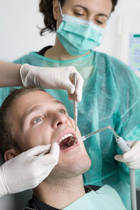 It should be the most obvious thing in the world to anyone with a modicum of sense living in central Leeds, that if after brushing your teeth, you find that there is a crimson ‘hue’ to your toothbrush, then your gums are suffering from bleeding and that you should seek advice on rectifying the problem as soon as possible to prevent the problem developing into something more serious. Apart from a mouth ulcer or a canker sore, bleeding gums are and indication that you may just be going through the early days of gum disease- and if this is allowed to mature, it will cause a continuous, albeit mild, poisoning of your blood system, causing problems to the major organs of your body further on down the line. Once you have consulted your dentists, there are ways to nip the problem in the bud quickly. Lots of calcium and vitamin C through a healthy and balanced diet will help build up the body’s immune system and promote greater levels of saliva in your mouth to thwart the build up of bacteria. Learn how to de-stress and relax more, and not by having a cigarette- this with add to the problem; of course, keeping your mouth free of food and bacteria by competent brushing and flossing of the teeth and tongue and rinsing with warm salt water for a long period, should be enough for the bleeding to stop.
It should be the most obvious thing in the world to anyone with a modicum of sense living in central Leeds, that if after brushing your teeth, you find that there is a crimson ‘hue’ to your toothbrush, then your gums are suffering from bleeding and that you should seek advice on rectifying the problem as soon as possible to prevent the problem developing into something more serious. Apart from a mouth ulcer or a canker sore, bleeding gums are and indication that you may just be going through the early days of gum disease- and if this is allowed to mature, it will cause a continuous, albeit mild, poisoning of your blood system, causing problems to the major organs of your body further on down the line. Once you have consulted your dentists, there are ways to nip the problem in the bud quickly. Lots of calcium and vitamin C through a healthy and balanced diet will help build up the body’s immune system and promote greater levels of saliva in your mouth to thwart the build up of bacteria. Learn how to de-stress and relax more, and not by having a cigarette- this with add to the problem; of course, keeping your mouth free of food and bacteria by competent brushing and flossing of the teeth and tongue and rinsing with warm salt water for a long period, should be enough for the bleeding to stop.





 Gum disease is a constant problem amongst people in Leeds. It affects more over 50% of us and is impossible to reverse once it has set in. But it is possible to stop in its tracks. Early signs of the problem can be difficult to spot but it first shows itself through bleeding gums after brushing. You may also notice the gums weeping that can leave a bad taste in the mouth. This is caused by a general lack of oral hygiene, allowing plaque to develop around the teeth and progressing into cavities, decay and loose teeth, as the gums recede. It can also be caused by poor diet, medication, smoking, stress and a low immune system causing the mouth to dry up, due to the lack of saliva. Treatment depends on how advanced the problem is. A regular visit to the dentist will eradicate any build up of plaque and tartar around the teeth and they can advise you on a program of good oral hygiene to prevent the problem in the first place. But if gum disease has set in, treatment may involve scaling the pockets of the teeth and making even more visits to the dentist than normal to monitor the problem.
Gum disease is a constant problem amongst people in Leeds. It affects more over 50% of us and is impossible to reverse once it has set in. But it is possible to stop in its tracks. Early signs of the problem can be difficult to spot but it first shows itself through bleeding gums after brushing. You may also notice the gums weeping that can leave a bad taste in the mouth. This is caused by a general lack of oral hygiene, allowing plaque to develop around the teeth and progressing into cavities, decay and loose teeth, as the gums recede. It can also be caused by poor diet, medication, smoking, stress and a low immune system causing the mouth to dry up, due to the lack of saliva. Treatment depends on how advanced the problem is. A regular visit to the dentist will eradicate any build up of plaque and tartar around the teeth and they can advise you on a program of good oral hygiene to prevent the problem in the first place. But if gum disease has set in, treatment may involve scaling the pockets of the teeth and making even more visits to the dentist than normal to monitor the problem. It can be quite disconcerting in Leeds to look down on your tooth brush to see blood after cleaning. It doesn’t mean the end of the world, but can indicate that you may have a little bit of a problem. It could be as simple as using a too harder brush or that you are brushing far too hard. But to be safe, it is important to seek advice from your dentist, because it could lead to more serious problems. The mouth is very fragile and can be easily affected by lifestyle- diet, smoking, drinking and stress, which makes regular check-ups all the more important. Bleeding gums can also result from bad oral hygiene and can indicate the early signs of gum disease. If bacteria and plaque is allowed to build up and not removed, it can lead to sore gums and at worse receding gums and tooth loss. Further down the line, it can lead to heart, respiratory and digestion problems. A simple visit to the dentist should be enough to nip the problem in the bud. Plaque and tartar can be removed quite easily and it is also the time for you to get advice from your dentist on how to maintain oral hygiene at home; what brush, paste and mouth washes to use and maybe, finally take advice on how you live your life and what you put into your mouth.
It can be quite disconcerting in Leeds to look down on your tooth brush to see blood after cleaning. It doesn’t mean the end of the world, but can indicate that you may have a little bit of a problem. It could be as simple as using a too harder brush or that you are brushing far too hard. But to be safe, it is important to seek advice from your dentist, because it could lead to more serious problems. The mouth is very fragile and can be easily affected by lifestyle- diet, smoking, drinking and stress, which makes regular check-ups all the more important. Bleeding gums can also result from bad oral hygiene and can indicate the early signs of gum disease. If bacteria and plaque is allowed to build up and not removed, it can lead to sore gums and at worse receding gums and tooth loss. Further down the line, it can lead to heart, respiratory and digestion problems. A simple visit to the dentist should be enough to nip the problem in the bud. Plaque and tartar can be removed quite easily and it is also the time for you to get advice from your dentist on how to maintain oral hygiene at home; what brush, paste and mouth washes to use and maybe, finally take advice on how you live your life and what you put into your mouth. Maintaining healthy gums is just as vital for oral hygiene as looking after your teeth. With experts suggesting that as many as seventy five per cent of Britons over thirty five years of age have some form of gum disease it has never been more important to take your gum’s health seriously. Bleeding gums are a sign that gum disease is taking hold and you should contact your Central Leeds dentist immediately if you notice it occurring.
Maintaining healthy gums is just as vital for oral hygiene as looking after your teeth. With experts suggesting that as many as seventy five per cent of Britons over thirty five years of age have some form of gum disease it has never been more important to take your gum’s health seriously. Bleeding gums are a sign that gum disease is taking hold and you should contact your Central Leeds dentist immediately if you notice it occurring. Gum disease is a problem that affects a lot of people all over the world. It can cause many health problems if it is neglected, the least of which are bad breath and bleeding gums. Your gums will bleed whenever you brush them and they will be very sensitive to the touch. These problems can severely affect your social life as you will quite naturally be uncomfortable while talking to others. If neglected, gum disease can have very serious consequences such as diseases of the jaw. One can even lose a few teeth if an inflammation of the gum is allowed to remain without treatment.
Gum disease is a problem that affects a lot of people all over the world. It can cause many health problems if it is neglected, the least of which are bad breath and bleeding gums. Your gums will bleed whenever you brush them and they will be very sensitive to the touch. These problems can severely affect your social life as you will quite naturally be uncomfortable while talking to others. If neglected, gum disease can have very serious consequences such as diseases of the jaw. One can even lose a few teeth if an inflammation of the gum is allowed to remain without treatment. Oral cancer is considered to be any cancer that is located in the oral cavity, including the lips, tongue and throat. It is usually manifested as sores on the tissue that don’t disappear naturally after a couple of weeks and can be life threatening if not caught early enough.
Oral cancer is considered to be any cancer that is located in the oral cavity, including the lips, tongue and throat. It is usually manifested as sores on the tissue that don’t disappear naturally after a couple of weeks and can be life threatening if not caught early enough. Oral cancer is a particularly virulent form of cancer that if not caught early can be fatal. Patients who catch the disease early stand an 80 per cent chance or greater of making a full recovery so it is vital that if you are suffering from any suspicious sores in the mouth you contact a dentist as soon as possible. It is also important that you keep up regular six-month appointments with your dentist as they are trained to spot the early signs of oral cancer.
Oral cancer is a particularly virulent form of cancer that if not caught early can be fatal. Patients who catch the disease early stand an 80 per cent chance or greater of making a full recovery so it is vital that if you are suffering from any suspicious sores in the mouth you contact a dentist as soon as possible. It is also important that you keep up regular six-month appointments with your dentist as they are trained to spot the early signs of oral cancer. More than 8 out of 10 of us have some form of gum disease, and yet 99 per cent of these cases exhibit no signs of the disease. For others with more serious cases of gum disease, bleeding gums is one of the most obvious signs that something may be wrong. Gum disease is seen by many to be fairly trivial, but this could definitely prove to be a mistake. Gum disease, or gingivitis as it is also known, can lead to tooth loss and even heart disease. It can also be symptomatic of a wider systemic illness. Over 90 per cent of all diseases in the body have some kind of oral manifestation, with bleeding gums being one of the more serious.
More than 8 out of 10 of us have some form of gum disease, and yet 99 per cent of these cases exhibit no signs of the disease. For others with more serious cases of gum disease, bleeding gums is one of the most obvious signs that something may be wrong. Gum disease is seen by many to be fairly trivial, but this could definitely prove to be a mistake. Gum disease, or gingivitis as it is also known, can lead to tooth loss and even heart disease. It can also be symptomatic of a wider systemic illness. Over 90 per cent of all diseases in the body have some kind of oral manifestation, with bleeding gums being one of the more serious.

